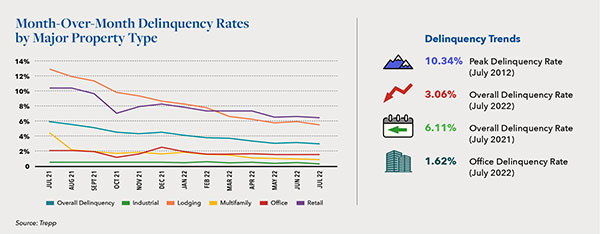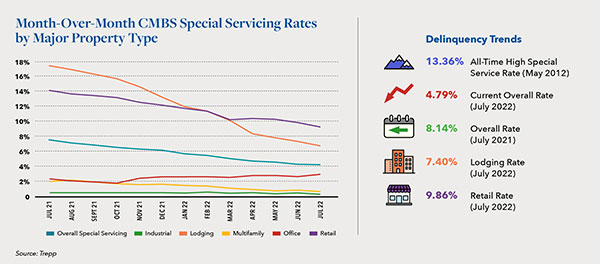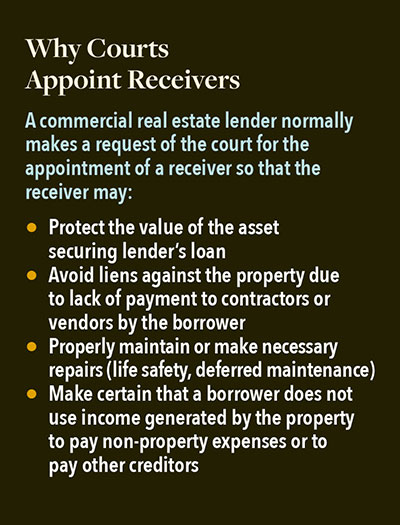The Case for Appointing a Commercial Real Estate Receiver in the Current Recessionary Environment

In this article we explore how current economic conditions are likely to drive commercial real estate loan delinquency and default rates higher in the coming months, and why now may be the optimal time for lenders with concerns about underperforming loans or uncooperative borrowers to consider exploring receivership.
Receivership is a legal remedy which exists in federal and state courts and provides a lender with the option of placing an asset legally into the hands of a court-appointed agent when concerns arise about a borrower’s ability or willingness to operate or manage that property effectively. These agents are known as “receivers.”
When receivers take possession of a real estate property, they collect rents, manage or oversee the property’s management, and under certain circumstances will sell the property. Overall, a receiver’s role replaces the borrower’s, in regard to the general operation of the subject property.
The receiver and its agents are a neutral arm of the court. As such, on a monthly basis a receiver is required to provide the court with a comprehensive report documenting its actions and decisions relative to the financials and operation of the property. The receiver’s role also provides for court oversight, ensuring that interested parties have an opportunity and place to either challenge or support a receiver’s decisions or actions.

During the aftermath of COVID, and based largely on the restrictions that took place, a large number of commercial real estate loans became delinquent. Government guidance and intervention enabled many of these loans to be granted forbearance agreements and other remedies for temporary payment/maturity relief. In many cases PPP funds, as well as other forms of assistance, have also allowed tenants and borrowers to catch up or remain current on their debt and rent payments.
While delinquencies have trended down somewhat over the past 12 months, the general consensus we are hearing among workout professionals at banks, insurance companies, private lenders and special servicers is that the delinquency rate is likely to soon increase, with the looming recession and a further expected rise in interest rates on the horizon. At the same time that many borrowers are being faced with the need to refinance debt at higher interest rates, those same elevated rates are also triggering Debt Service Coverage Ratios (DSCR) and bringing down loan leverage. As a result, borrowers are finding a gap in the loan size and an inability to refinance out their existing loan without bringing more equity to the table to pay off the existing loan.


A receiver owes a fiduciary duty to both the property and the court. So, although a lender is typically the party requesting the receivership, it is important to note that a receiver does not act only on behalf of the lender, but instead, acts in the best interests of both lender and borrower. That said, appointment of a receiver provides a valuable service specific to a lender involved in commercial real estate by safeguarding the long-term value of the subject property and helping to pave the way for a clearer path to either resolution with a borrower or foreclosure.

OVERSEEING THE PROPERTY
A receiver’s mandates are outlined in the court order and the receiver normally takes a series of actions including the following when overseeing the associated property: 1) execution of new leases, 2) authority to grant tenant rent relief, 3) collection of rents, 4) day-to-day property management or oversight of property management services, 5) payment of bills for utilities and contractors, 6) repair of deferred maintenance, 7) correction of life safety issues.
Lastly, as referenced earlier, under certain conditions the receiver may also direct the sale of the property.

SALE OF THE PROPERTY
There are many advantages to having the receiver sell the property. If the subject loan is burdened with a high prepayment penalty or defeasance, the receiver can sell the property with the assumable loan in place. Importantly, a receivership sale of the property or note serves to keep the lender out of the chain of title and therefore reduces lender liability for construction defects and other issues. The receiver is also empowered to widely market the property or loan, either selling the property/loan themselves or hiring a knowledgeable third-party broker to help drive the highest possible sales price.
CONCLUSIONS
The rise in interest rates and the unlikely event of more government intervention has the vast majority of loan workout professionals expecting a significant increase in distressed loans within
their portfolios.
Utilization of a receiver provides a lender with the assurance that their collateral is being safeguarded and mitigates risk to the lender and property. This allows the lender to focus on resolving the loan via foreclosure, deed in lieu, note sale or other means available to them. The confidence that the property is not being mismanaged (intentionally or unintentionally) during this process is beneficial to both the lender and the borrower.
The second and third quarters of this year have been difficult for many borrowers across multifamily, office, industrial, hospitality and, of course, retail. If these or other borrowers in your real estate portfolio are becoming a greater concern than anticipated, or if your previous interventions to-date have been ineffective, we encourage you to reach out to our team at Hilco Real Estate to discuss those situations and our ability to assume a receiver or other helpful role on your behalf. At present, we are actively involved in work throughout the country involving hundreds of properties, their property managers and lenders. Those engagements and the many interactions we have with our peers and partners across the industry on a weekly basis provide us with valuable insights and information that we welcome the opportunity to share with your organization. We are here to help.
Hilco Real Estate is the one of the industry’s most respected and accomplished authorities on real estate repositioning and disposition, advising and executing strategies to help both healthy and distressed clients maximize the value of their real estate assets. Engaging Hilco produces significant benefits for companies looking to explore evolutionary ideas, in an effort
to minimize downside and maximum upside. Our executives bridge the gap between traditional real estate expert and formal business consultants, understanding how to evaluate assets, structure a plan of attack, and effectively execute said plan.




